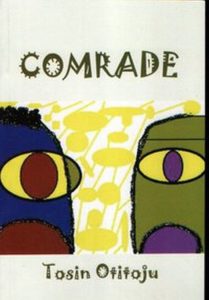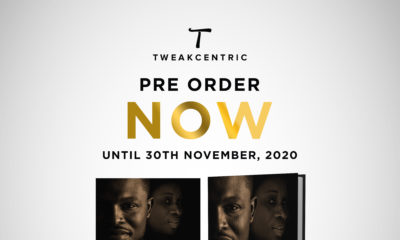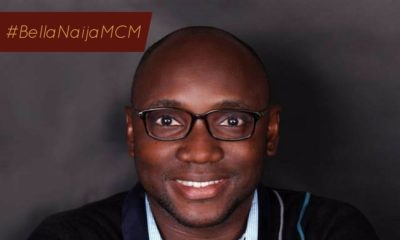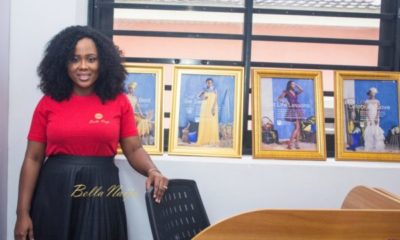News
Tosin Otitoju: A Whiz Kid’s Journey of Self-Discovery & Fulfilment
 Born on May 1, 1981, Oluwatosin Helen Otitoju is perhaps the most decorated young Nigerian her age. At a tender age of 14, she was already the head girl of Queens College, Lagos. She had the second best Junior School Certificate results nationwide and became the overall best in the May/June 1996 Senior School Certificate Examinations. She went on to shatter records at the Howard University, graduating Summa Cum Laude (First Class) in Electrical Engineering and becoming the first ever Howard graduate recipient of the Poincaré Fellowship at the California Institute of Technology for postgraduate studies. In 2004, she received a national merit award (FRM) from the Nigerian government and two years later received the Young Person of the Year Award at The Future Awards 2006. Less than three years later, she had a teaching stint in Yola, Adamawa State, and currently lectures at the Department of Systems Engineering, University of Lagos. An Associate of the Nigeria Leadership Initiative, she holds a Masters degree in Control and Dynamical Systems from Caltech and is the author of Comrade, a collection of poetry published in 2010. She was actively involved in Caltech Theater Arts (2002-2006) as an actress in five full productions, including Molière’s The Misanthrope, Shakespeare’s Measure for Measure and As You Like It, and modern works: Inspiration by Iona Morris and Krishna by Sid Jaggi of OASIS. In this exclusive interview with BN Editorial Assistant, Gbenga Awomodu, she shares details about quitting her PhD programme, teaching experience in Nigeria, and her continuous journey of self-discovery and fulfillment in marrying science and the Arts.
Born on May 1, 1981, Oluwatosin Helen Otitoju is perhaps the most decorated young Nigerian her age. At a tender age of 14, she was already the head girl of Queens College, Lagos. She had the second best Junior School Certificate results nationwide and became the overall best in the May/June 1996 Senior School Certificate Examinations. She went on to shatter records at the Howard University, graduating Summa Cum Laude (First Class) in Electrical Engineering and becoming the first ever Howard graduate recipient of the Poincaré Fellowship at the California Institute of Technology for postgraduate studies. In 2004, she received a national merit award (FRM) from the Nigerian government and two years later received the Young Person of the Year Award at The Future Awards 2006. Less than three years later, she had a teaching stint in Yola, Adamawa State, and currently lectures at the Department of Systems Engineering, University of Lagos. An Associate of the Nigeria Leadership Initiative, she holds a Masters degree in Control and Dynamical Systems from Caltech and is the author of Comrade, a collection of poetry published in 2010. She was actively involved in Caltech Theater Arts (2002-2006) as an actress in five full productions, including Molière’s The Misanthrope, Shakespeare’s Measure for Measure and As You Like It, and modern works: Inspiration by Iona Morris and Krishna by Sid Jaggi of OASIS. In this exclusive interview with BN Editorial Assistant, Gbenga Awomodu, she shares details about quitting her PhD programme, teaching experience in Nigeria, and her continuous journey of self-discovery and fulfillment in marrying science and the Arts.
Could you briefly describe your journey from primary school to the California Institute of Technology?
After Primary 1, I was promoted to Primary 3 where I was in the 8th position after the first term; 7th after the second; then, after that, I probably remained 1st. My dad was very competitive and wanted me to be the best. There were only two terms in JSSI and when I came 23rd, out of over 300 students, I started crying, like they were going to kill me at home. They didn’t. Then, I moved to the 11th position. In JSS 2, I was 5th, and then there was a turning point: there was a Speech & Prize Giving day, but I couldn’t give my parents the invitation card out of shame. I decided to work towards the next session so I calculated what I needed to top the class. I worked towards it and even overshot it! And the rest is history. I finished secondary school in 1996 and had the best national result in the May/June 1996 SSCE. In June 1996, I took part in the EESI programme sponsored by NASA and entered the Howard University to study Electrical Engineering in 1997. I started working on my PhD in 2001 and got the FRM, a national merit award from the Nigerian government in 2004. I don’t go around thinking about the laurels or letting them get into my head. Maybe that’s good…
Any fond childhood memories?
Running, skipping, and jumping to/from the house on TinCan Island. It was an idyllic place. You know – cooking with sand and leaves, and one time we planned and planned a Christmas concert…
Why did you halt your PhD programme at Caltech?
I was satisfied that I had learned a lot and by that time there was a mismatch between what a PhD is about – deep research into a small topic – and my broader goals. I didn’t have a strong research interest or a clear path to the PhD. On the other hand, I had developed strong interests outside my PhD and was pining to explore them. Put it another way, I had overdosed on elite science and wanted a change of diet. Some people call this whole thing “burnout”. Anyway, it’s a complex and popular PhD disease… There are not so many places where you find such intellectual density. It’s so super amazing, but it’s very irritating too because there’s nobody else. Nobody you can talk to and share problems with. No church, not many religious people, no buffers – people who care. No real community – everybody’s just really, really, smart…really, really, competitive… After you go to a place like that, you appreciate women. In the absence of this oiling, and the people who say “how was your day?” and pay attention, the world wouldn’t work. People didn’t understand me, I didn’t understand them, but I knew that I was in an amazing learning experience and the emotional climate there was horrible.
In July 2006, I let people know I was heading out. I talked to my friends and they gave me good advice. I told them everything that I thought that I had been going through and what I had decided and they told me what they thought. Six months before I quit, I had spent a month in Yemen in the Middle East studying Arabic and that was probably why I finally made the move out of grad school because when you have been that happy, it makes it less tolerable…
Could you describe your experience in Yemen?
Not everyone has experienced falling deeply in love – with a place. I can say that I have. I felt something indescribable in my five weeks there. I’ll have to turn to one of my poems to explain:
In each town
I will stand on a roof, trembling with pleasure
When the spirits in the sights and the sounds whisper:
Stay, stay in this your primordial home.That first reunion with the winds
Carrying the sands from the brown mountains of South Arabia –
It was like falling deep in love.
It drew love songs from my lips and tears from my eyes.
Let me return to Yemen before the longing drives me mad. (from Arven: The Inheritance, in Yalla!)
My next-to-be-published poetry collection is about the joy of travel and the essence of place; of location. It is titled Yalla! (Let’s Go), Yemen had amazing Architecture and that was the first Eastern place that I liked. I just had a perfect time there. Everything was right, felt very right like I was from there in a sort of ancestral sense. Well, I returned from Yemen to Pasadena, California, where I was again not in love. With such a marked contrast, what could I do but leave?
 How did you find California after you returned from Yemen and what were you up to for the period before leaving the US?
How did you find California after you returned from Yemen and what were you up to for the period before leaving the US?
The moment you go to Yemen and you’re like “this is life… wow!” and then you come back? When I came back, it was like Jesus after praying on the mountain for forty days, all pure and everything, clean and happy and, you know? Then, you’d interact with somebody like two minutes and then you feel the toxins coming back, and then you’re thinking ‘maybe I can breathe… maybe I can let it out’, and there are so many things that happen and within a week, it’s like you’re back to your nervous state again… so it wasn’t easy… so I started saying to myself again… me with the PhD, me without the PhD, plus or minus… you know? I went to an Arab film festival in San Francisco. For once, I could actually, see events, and just attend whenever I wanted. I also watched a lot of tennis. I was looking for a job with truth, with excitement. But it was hard to take any. I wasn’t going to lock myself in something I wasn’t ‘mad’ about. I had a few dollars saved; I always have a few dollars saved. That way you can live; you can do your own life. You won’t be like ‘If I don’t do this, then I can’t eat tomorrow’. I don’t spend a lot and I like money for security. It was just a big change from the really stressed thing. It was hard for me to even do credible interviews because I was very honest with myself and with the interviewers and many people would just politely run away, because when you are talking about freedom… the interviewer’s like “No!…You will not be free, go!” I was blogging a lot. I wanted to start teaching for a while; that didn’t work. I did one little FOREX trading thing. I just played, you know? On the last day of 2007, I think, I left the U.S. and in 2008 I had a job in Egypt. I worked in Cairo at a Software company for six months. It’s very good for the soul. Sunshine is there and the people are warm. I love the Middle East, not necessarily Egypt. I loved Egypt, but I love Yemen more. I will do my honeymoon in Yemen, if I ever married someone (I didn’t say I was marrying anybody) Anyway… [laughs]
How has your teaching experience in Nigeria been, and what challenges you have had to tackle so far?
In Yola, they gave me a lot of freedom there so it was great… I’m still in touch with my students; even though some of them have now graduated. I had a quick stint in Abuja, then Lagos. I like acada, but I don’t like Lagos. I’ve found my way to adapt and enjoy it, but spiritually still, I’m not a Lagosian. 20 years from now, when Lagos is Barcelona, I may actually be in tune, but now mehn! I’m passing through! (laughs) I’m a pilgrim. I like the north; I love rural life right now. I love teaching and learning, in any country. I love the heightened sense of mission when it’s in my home country. We have to take better care of our young people, not the criminal neglect that exists. Care for our youth includes providing for their food and security, but it also includes their social and economic development, which is ensured by sound education. Nowadays you still see classrooms in Nigerian universities with hundreds of students – this is an insult to the students, it shows a lack of care. In the academic world, they try to tell people that it’s all about research; it’s not about teaching. Really, what does the world need? More critical people, more educated, more prepared and then you say somebody who’s providing that service is inferior? My former advisor was interesting by being unconventional and weird and he had a world record in rowing. For instance, he didn’t put a lot of equations on his slides…
What do you miss about the Caltech environment and when do you intend to go back to finish up your PhD programme?
At a place like Caltech, you learn about extreme efficiency. We’re perhaps the most intense technical institute in the world. We joke that MIT exists “because not everyone can go to Caltech.” Besides being saturated with brilliance, it’s also wealthy. All this is to say that it’s an excellent place for science and I don’t miss it. However, I would like to get another dose of immersion in which I would learn something new and important. It’s also somewhat important to me to write a thesis and get closure; to slay the dragon as it were. Yet I must say my work right now is very fulfilling, and the PhD itself will add little value to my life. I should return in about one year; I’m looking for funding now.
What is the single most important decision you have made in the last decade?
No idea which one. I like my decisions.
 How do you manage Engineering and Literature?
How do you manage Engineering and Literature?
I teach engineering better because I have been a performer and writer, and I started thinking more creatively about scientific research only after I gained confidence as a published writer. On the other hand, I think my literature is part social engineering, part language engineering. I like the synergies. However, it seems I have to educate people about the synergies, since many people are wedded to the specialization myth: this is art – that is science – this is social science – that is language.
What inspired your collection of poetry and its title – Comrade?
I had just returned to Nigeria and felt sad about the society I was seeing. We had not united to improve our lives – no wonder things were so bad that we did not have simple electric power, let alone justice or prosperity. Not only was there a lot of work to be done to build the society, but also all the people were not busy building. Then I went to Yola for NYSC, and it was so dreamy and peaceful that I started writing tonnes of poetry. I decided the first collection, where I put all the political-, or struggle-, themed poems had to be called Comrade. The word evokes images of coming together and acknowledging a shared struggle. We struggle because we want better, and there is no shame in it. It seems the Nigerian youth today has got that message actually.
If you were Nigeria’s president, how would you solve Nigeria’s electricity problem?
If I was the president of Nigeria, I would ask Ernest Ndukwe, formerly of NCC – the telecoms regulator – to spearhead the deregulation of the Electric Power Industry. Since I am not the president of Nigeria, I am asking him to do so. (President Jonathan, you don hear?) We are lucky to have several great talents in this country, yet so often we do not respect the importance of the right person in the right job.
What are your personal dreams for the next ten years?
I want to marry Rafael Nadal – tough one, he has a lovely girlfriend. I want to keep being an academic – one that is successful in relation to my students and other academics, and also publicly, in engagement with the larger society.
What are your plans for marriage, or are your folks not giving you the eye or even raising the question?
I’m interested in partnering with someone, but (fortunately for me) I’m not overly driven to accomplish this or to do so by a certain date. OK, to be honest, I go out of my way to deter some applicants because some people have longa-throat – they want to be with someone that they can’t handle. Later now, they’ll say “do this”, “change that”. If it’s love that we’re talking about, I think it’s not romantic to set goals on love.
Why do you keep a haircut, unlike many other ladies who do more sophisticated things with their hair? How do you respond to people who give you that quizzical look?
My hair is natural and beautiful and random and nice. I don’t think people looking quizzically is like, sinister or anything so I suppose it’s not a problem. Sometimes people go beyond looking and advice me to do something different and on occasion I take that advice. I understand that some people may not be used to jagajaga hair as a style, but the hair is not sinister or anything and the owner-of-the-head likes it, so kini big deal?
How do you spend your leisure time?
Usually reading, but these days I want to spend more time swimming and/or watching tennis.
What would you say to young Nigerians out there who hope to make a positive change in our nation?
This is our time, this is our home. This is it. And we are capable. And my favourite colour, since you didn’t ask? I’ve never met a brown that I did not like. Other than that, green makes me happy. Both are colours of earth and nature. Some occasions call for red, on the rare occasion that I need to attract attention, like for a book cover.
____________________________________________________________________________________________
Tosin Otitoju blogs on Up Naira (Money Talk), LifeLib (Personal Blog) and X in Vogue (Math Blog).
Gbenga Awomodu is a freelance writer and editor. He blogs at Gbenga’s Notebook!, a repository of his thoughts and other works.
Photo credit: Jide Odukoya




















